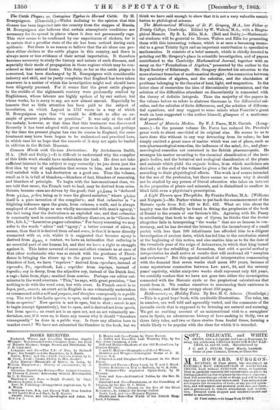Common Words with Curious Derivations. By Archdeacon Smith, M.A. (Bell
and Daldy.)—It is difficult to understand why the compiler of this little work should have undertaken the task. He does not take sufficient interest in the subject to copy correctly ; he jots down just the first idea by way of explanation that occurs to him, and he seems as well satisfied with a bad derivation as a good one. Thus the volume, small as it is, is full of blunders,—blunders of fact, blunders of reasoning, and blunders of principle. To begin with the last-mentioned class, we are told that mener, the French verb to lead, may be derived from mince, threats, because oxen are driven by the goad; that yxiZo-ria is "deduced from 7),6gry, polire, being as it were the glazed member," where yX6sis itself is a pure invention of the compiler's ; and that calamitas is "a blighting influence upon the grain, from calamus, a stalk, and is always employed of such things as are wholly unconnected with man's agency,', the fact being that the derivation is an exploded one, and that calamitas is constantly used in connection with military disasters, as in "Cicero de Div., Lib. L," "Leuctricte pug= calamitas." For funny reasoning we may refer to the words "adore" and "agony ;" a better account of adore, it seems, than that it is derived from ad and orare, is that it is more directly connected with os, oris, whilst it is suggested that because agony is derived from aro, a contest, we have an intimation that suffering is no essential part of our human lot, and that we have a right to struggle against it. This latter reversal of cause and effect reminds us at once of that other ecclesiastic who was so struck with the goodness of Provi- dence in bringing the rivers up to the great towns. With regard to blunders of fact, we have "reprieve" derived from tvrobare, instead of rsprendre, Fr., reprehendo, Lat. ; empecher from impingo, instead of incite:Ho; coy in decoy, from the adjective coy, instead of the Dutch kooi, a cage ; faint from forgo ; sentinel from sentina. Perhaps our editor cul- ininates in the word overture. "This," he says, with great precision, "has nothing to do with the word over, but with overt. In French ouvrir is to begin, part., ouvert; an overt act in English is one voluntarily undertaken or commenced with a will and purpose, and therefore consequently in a public way. The root is the Latin operire, to open, and stands opposed to covert, from co-operire." Now operire is not to open, but to shut ; ouvrir is not to begin (except figuratively), but to open, and is derived not from operio, but from aperio ; an overt act is an open act, not an act voluntarily un- dertaken, nor, if it were so, is there any reason why it should "therefore consequently" be done in a public way. Is there any allusion here to market overt? We have not exhausted the blunders in the book, but we
think we have said enough to show that it is not a very valuable oentri- bution to philological science.


































 Previous page
Previous page